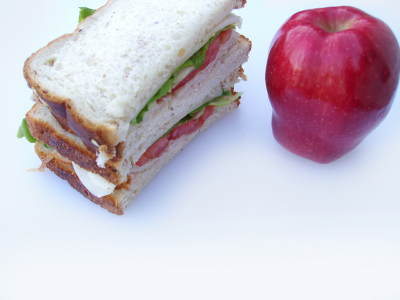Did you know that good nutrition does more than feed your children�s bodies? It also feeds their brains. Eating the right nutrients helps children�s brains develop and grow so that they can think more clearly and handle stress better. For example, a study of 200 students found that eating bananas for breakfast on the day of an exam helped the students stay more alert. Here are some examples of important nutrients for the brain.
 Good nutrition does more than feed your children’s bodies—it also feeds their brains. Eating the right nutrients helps children’s brains develop and grow so that they can think more clearly and handle stress better. For example, a study of 200 students found that eating bananas for breakfast on the day of an exam helped the students stay more alert, while also having the right nutrients in their body with the best resources online so parents can learn more about precision nutrition and how to keep their children healthy.
Good nutrition does more than feed your children’s bodies—it also feeds their brains. Eating the right nutrients helps children’s brains develop and grow so that they can think more clearly and handle stress better. For example, a study of 200 students found that eating bananas for breakfast on the day of an exam helped the students stay more alert, while also having the right nutrients in their body with the best resources online so parents can learn more about precision nutrition and how to keep their children healthy. Important nutrients for the brain include
- Carbohydrates
- Protein and amino acids
- Fats and fatty acids
- Vitamins and minerals
- Phytonutrients
- Water
Carbohydrates
Complex carbohydrates provide long-term, sustained energy to your child’s brain. Good carbohydrates for your child include whole-grain bread, potatoes, legumes, whole-wheat pasta, brown rice, fruits, and vegetables.
Simple sugars, on the other hand, disrupt blood sugar levels. These sugars, which are found in such items as candy and baked goods, makes learning more erratic and makes children fidgety and irritable.
Proteins and amino acidsChildren need about one ounce of protein per day, either animal proteins (meat, poultry, eggs, and dairy products) or plant proteins (beans, lentils, nuts, and seeds).
Protein includes essential amino acids that the body doesn’t make and therefore must be provided by diet. These amino acids are vital to brain chemistry and emotions.
Fats and fatty acidsThe brain is composed of 60 percent fat, which has to come from the diet. Fat, therefore, is essential for brain development. However, you want to make sure you are providing your child the right kinds of fat. The best fats for the brain are long-chain polyunsaturated fatty acids, such as omega-3 and omega 6. Omega-3 fats are found in oily fish such as tuna and salmon, eggs, and plants such as flaxseed. Omega-6 fats are found in nuts and seeds, as well as corn, safflower, and sunflower oils.
Vitamins and mineralsBrain function is influenced by a variety of essential vitamins and minerals. The table below lists important vitamins and minerals and where you can find them:
|
Vitamin A
|
Protects the brain from toxins and pollution
|
Dairy, meat, fish, eggs fruit, and vegetables
|
|
Vitamin E
|
Protects the brain from toxins and pollution
|
Nuts and seeds and their oils
|
|
Vitamin C
|
Turns food into mental energy
|
Kiwi and citrus fruit, berries, green vegetables, tomatoes and bell peppers
|
|
B vitamins
|
Produces brain neurotransmitters (messengers)
|
Whole grains, eggs, green vegetables, brown rice, meat, fish, legumes, nuts and seeds
|
|
Calcium
|
Relaxes nerve and muscle cells
|
Dairy products, almonds, apricots, seeds, sardines and green leafy vegetables
|
|
Magnesium
|
Relaxes nerve and muscle cells
|
Soybeans, whole grains, nuts, dried fruit, green leafy vegetables and meat
|
|
Choline
|
Improves memory and thought processes
|
Egg yolk, sardines, liver, nuts, legumes and grains
|
|
Zinc
|
Improves memory and brain function and makes the brain-calming chemical serotonin
|
Dark turkey meat, shellfish, beans and whole grains
|
|
Boron
|
Improves memory, attention, and mental alertness
|
Nuts, apples, broccoli, peas, grapes and legumes
|
|
Iron
|
Improves concentration, increases IQ scores
|
Red meat, molasses, cocoa, parsley, eggs, legumes, green vegetables, liver, shellfish and fortified breakfast cereals
|
|
Selenium
|
Protects the brain from heavy metals such as lead
|
Whole grains, cereals, tuna, shellfish, liver, dairy products and eggs
|
 While it is best for your children to get their nutrients from food, you can also give them a multi-vitamin to fill in any gaps in their diet.
While it is best for your children to get their nutrients from food, you can also give them a multi-vitamin to fill in any gaps in their diet.PhytonutrientsPhytonutrients promote brain [tag-cat]health[/tag-cat] and protect brain cells from damage. Fruits and vegetable with bright colors, such as red bell peppers, dark leafy greens, and purple grapes, tend to be rich in phytonutrients.
WaterWater hydrates brain cells so they can function at their best.
Now you know what nutrients your child’s brain needs to function at its best. Read The Best Brain Foods to find out what foods you need to offer to provide these nutrients for your children.
No part of this article may be copied or reproduced in any form without the express permission of More4Kids ©











Add Comment